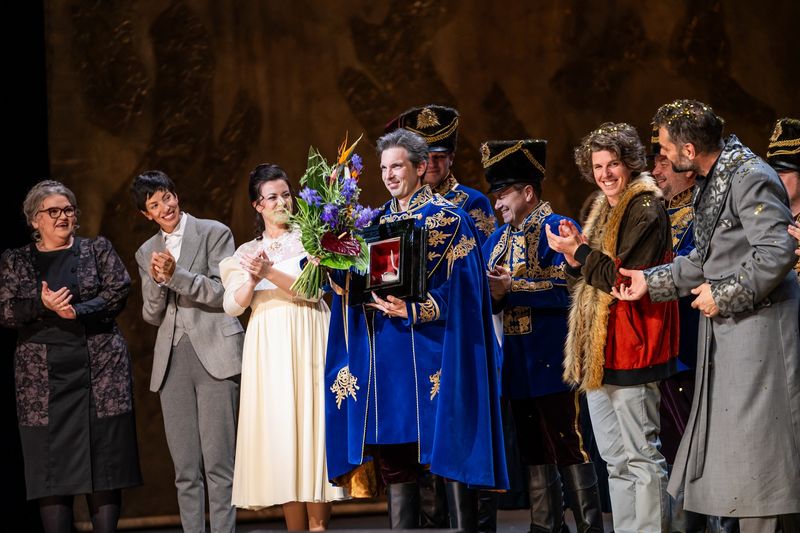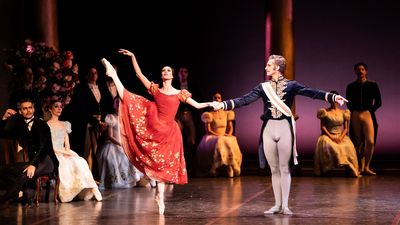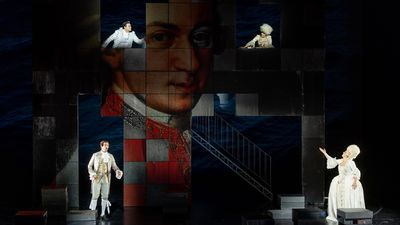
On 15 May 2024, during the curtain call following a performance of Boris Godunov, the outstanding baritone was surprised with the announcement that he would be one of the recipients of the Hungarian State Opera's greatest honour for the next season. He was presented with a swan-shaped award made by the Herend Porcelain Manufactory by artistic director András Almási-Tóth, amidst the celebration of his colleagues and the audience.
Zsolt Haja, who had already been a Chamber Singer of the Hungarian State Opera before (in the 2019/20 season), gave an outstanding performance in the title role of the world premiere production of Valuska by Péter Eötvös in the current season. He also gave a memorable performance as Sharpless in Madama Butterfly during the OPERA's Dubai tour at a moment's notice. Audiences could see him in his iconic roles throughout the season including Papageno (Die Zauberflöte), Falke (Die Fledermaus), Yeletsky (The Queen of Spades), Silvio (Pagliacci), and he participated in Mahler's Symphony No. 8. Following the Boris Godunov series, in which he sings Shchelkalov, he will return as Napoleon in War and Peace, and will reprise one of his first roles, Figaro in a new production of Il barbiere di Siviglia on Margaret Island, a role he will also perform in the upcoming season besides Valentin in Faust, William Cecil in Maria Stuarda, and Malatesta in Don Pasquale as well as taking part in a monumental production of Gurre-Lieder.
Zsolt Haja completed his studies in his home town of Debrecen under Dr. Éva Mohos Nagy, and it was also there his career started. He made his Hungarian State Opera debut in 2008, in King Pomade's New Clothes. He has become one of the most versatile and popular baritone of the OPERA, his repertoire ranging from baroque to contemporary compositions. He performed such roles as Albany (Lear); Albert (Werther); Almaviva (Le nozze di Figaro); Bagó (John the Valiant); baritone solo (Carmina Burana); Ben (The Telephone); Biberach, Petúr, Tiborc (Bánk Bán); Conrad (Die Rheinnixen); De Nevers (Les Huguenots); Delaura (Love and Other Demons); Don Giovanni; Donner (Das Rheingold); Escamillo, Morales (Carmen); Frank (Edgar); Ford (Falstaff); Palatine Gara (Hunyadi László); Guglielmo (Così fan tutte); Gunther (Götterdämmerung); Háry János; Hommonay (Der Zigeunerbaron); Jake (Porgy and Bess); Suitor (The Spinning Room); Marcello, Schaunard (La bohème); Orestes (Iphigenie auf Tauride); Ottokar (Der Freischütz); Old servant (Elektra); Pelléas (Pelléas et Mélisande); Peter (Hänsel und Gretel); Sebastian (The Tempest); Geisterbote, Voice of a Town Watchman (Die Frau ohne Schatten); Valentin (Faust), and he participated in various oratorios.
With the chamber singer award, modeled after the Kammersänger title known from German opera houses, the management of the OPERA wishes to express its appreciation for its outstanding active soloists, appreciating their talent and stage performance. A maximum of three people can hold the title of Chamber Singer, which also comes with special remuneration during the season, an opera singer, who has not received the Kossuth Award yet, may be awarded the title a total of three times. In the past decade, the accolades were presented at the end-of-season Night of Stars gala. As an innovation, they are now presented during the season, allowing the audience to share in the surprise and joy of their favorite artists. Earlier this season, it was Polina Pasztircsák and Péter Kálmán who received the title after their performances in Arabella and Parsifal, respectively.


